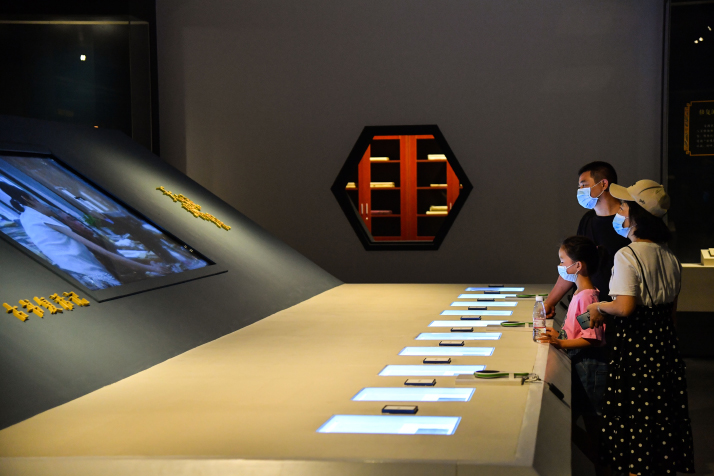| Lifestyle |
| Bringing classics to life | |
|
|
 People visit an exhibition on the restoration of classic books at the National Museum of Classic Books in Beijing on August 5 (VCG)
Ancient Chinese classics have never been shown in this way. In a Beijing theater with three stages, crew members spent almost two years rendering 11 classic books, including Analects of Confucius and Dao De Jing, into a TV drama series. Titled, China in the Classics, the multi-series program produced by China Media Group (CMG) is a mishmash of cultural seminars, dramas about classics, and digital screens to visualize the classics. Two stages, one featuring experts explaining the classics and another performers acting out scenes related to the classics, are connected with a lane-shaped third stage, a "time-machine lane" where a modern host travels back in history and meets ancient sages played by renowned actors. At the background, more than 10 large screens show settings relevant to the dramas. The host talks with sages, asking them questions of interest to viewers, and introduces the sages to modern society to see how their thoughts were passed down over the generations. Li Guoqiang, Vice President of the Chinese Academy of History, hailed the series for recreating and restoring history, adding that it allows people to learn about classics while thoroughly appreciating China's longstanding and prosperous civilization. The spark of inspiration When speaking of his motivation for creating the series, Shen Haixiong, President of CMG and the program's producer, recalled a visit to his professor's home while he was in college over 30 years ago. He was awed to see piles of thread-bound Chinese books in the professor's apartment. But the professor worried that his children and grandchildren might not be interested in reading these difficult books, since the younger generations were less likely to sit down and patiently read page by page. Thus Shen hit upon the idea to create a program to cater to the younger generations, who are more used to watching videos on smartphones and other digital devices. Zuo Xing, General Director of the program, added that the program's preparation took over 10 months, with a large amount of materials collected before the production of every episode. For the Book of Documents episode alone, they read 68 related books and thousands of essays, consulted 65 experts and modified the script 53 times. The second season of another 10 classics is currently in production, with two episodes already released. "The production period was extended as the team tried their best to make it the best," Zuo said during an online lecture on December 12. "We planned to make it a weekly series, but finally made it a monthly show, with the expenditure far exceeding the budget." Dialogue over thousands of years The brain-racking efforts finally paid off and led to a blockbuster series. The first season in 2021, consisting of 11 episodes on China Central Television, won over 6 billion clicks on various video platforms, setting a new viewing record and ignited "Chinese classics fever" among young people. "Each classic has very rich connotation so it's impossible to capture all of it in a 90-minute episode," Zuo said. "So we choose to tell stories of the author, the compiler or other people behind the classics, such as those preserving the classics." The Analects of Confucius episode for example, tells the story of Confucius from the perspective of Zigong, a disciple. Zigong followed Confucius on a tour around surrounding states and witnessed the difficulties in promoting benevolent governance and virtuous rule among state governors, as well as Confucius' firmness. As a very important figure in Chinese history, Confucius also appeared in other episodes, including Dao De Jing and the Changes of Zhou, offering a clearer story line for understanding the connection among the classics. "Since paper and printing is so ubiquitous today in our life, we might forget that in ancient times people could only engrave on turtle shells or bamboo slips to keep words alive," said Qiu Biying, a college student in Beijing who watched this episode. "It made preserving classics very difficult especially during war time." One episode features Fu Sheng, who spent his life protecting the Book of Documents, after the first emperor of the Qin Dynasty (221-206 B.C.)demanded all the classics be burned to ashes. Known as China's "ancestor of political documents and the origin of historical records," the Book of Documents is the foundation of the earliest system of knowledge in Chinese civilization. Fu chose to flee with his wife and son to hide the book, which ultimately led to the death of both his wife and son. At the end of each episode, the characters are taken to the modern world by the host. Fu is taken to an exhibition of the Book of Documents in a contemporary library, where the librarian tells children the story of Fu's contribution to protecting the classic. In addition to the gripping plots, the exquisite stage settings and masterful performances create a vivid visual experience for audience. "It is the best program on Chinese classics that I have ever watched," a netizen posted online after watching some episodes. "We learned many of the sentences from the classics but never have we seen such a live picture of how it was like in ancient times." It is reported that many Chinese literature teachers are now utilizing clips from the program for classroom use. The TV program has also inspired people to showcase classics in novel ways. On November 21, an exhibition titled China in the Classics opened in Huzhou, Zhejiang Province, displaying classic books with digital technologies to enhance interaction with visitors. "Cultural confidence is the most fundamental, profound and long-lasting factor in the growth of a nation and its people," Shen said, adding that CMG will continue to produce creative programs to bring the distinctive traditional Chinese culture to life. Copyedited by Rebeca Toledo Comments to yuanyuan@cicgamericas.com |
|
||||||||||||||||||||||||||||
|